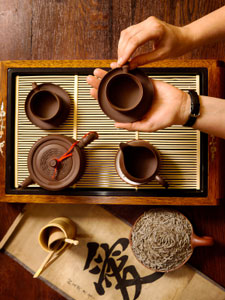Bringing tea to life



Passion is an elusive and incredibly diverse concept. For some, passion is inspired by nature and others by art. Some discover their passion in accomplishment and others in relationship. Some are inspired by thought and others by experience. My objective is to inspire passion for tea in every customer that walks through the door. Accomplishing that requires insight, skill, knowledge and PASSION!
My favorite interview question is "What are you passionate about?" There is no wrong answer. It can be anything from cooking to shopping to travel. I don't really care. The key is the follow up question. "Tell me why you are passionate about it. What about that excites you. Pretend I know nothing about it (gardening, music, art, whatever) and explain it to me." If an employee can't communicate their OWN passion in a compelling way they can never inspire a customer to be passionate about tea. I'm glad to teach someone what they need to know about tea, but I can't teach passion and don't have time to teach the basics of communication.
Assuming we have a team capable of getting excited and communicating effectively, the next step is to understand the customer. I could (and probably will at some point) write several articles about the types of customer that frequent tea shops and how to cater to them. For the purposes of this discussion, I would suggest that passion for tea can be ignited in a customer through appeals to their intellect, sense of romance and their senses.
The intellectual appeal covers the science of tea, production of tea, health benefits of tea, and, to some extent, the history of tea. Some customers are driven by a thirst for knowledge and love to know where and how a tea was grown or how much caffeine or antioxidants a tea may have. These customers may or may not be terribly interested in culture, tradition or even flavor.
The romantics among us care little about polyphenols or oxidation and have no interest in fanciful flavored teas. The romantics are all about the culture, tradition and history of tea. They love imagery of tea gardens and get excited by legends and lore. For these, tea is a way to connect to nature, history and far away lands. It is a spiritual experience.
Customers driven by their senses may not want to hear you talk at all, but can spend hours looking, smelling and tasting tea. They may be interested in the nuanced muscatel of a First Flush Darjeeling or rich, bold flavors of chocolate and banana. These customers are all about the experience.
The key is to teach your employees (and yourself) to quickly identify what drives a customer and then to see the world through their eyes. Speak their language, share their passion for knowledge, romance or sensory experience, and thereby feed their passion for tea. Misreading a customer, or approaching every sale with the same template, tells the customer that THEIR passions and interests are either wrong or not as valid as yours. A passionate employee who fails to speak the language of the customer may come across as impressive, but will never transfer their passion to the customer.
At the end of the day, we open stores to give the customers something they want. Everyone in the tea business needs to understand that customers are not looking for tea. They are looking for an experience (flavor, relaxation, education), feeding an identity (cultured, relaxed, healthy), or pursuing a goal (health, knowledge, etc.). The most loyal customers are those that identify on a personal level with YOUR product. THAT is your mission.
Adagio Teas
Twitter: @AdagioRetail
